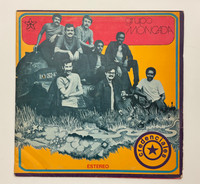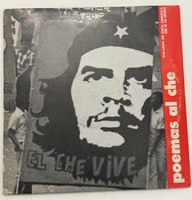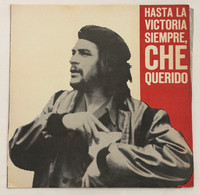- Travel
-
Exhibits
- José Fuster
- La Portada Cubana
- Immortal Cuba: Artists Take on Their Heroes
- Seattle Poster Exhibit
- Sandra Dooley & Alejandrina Cué
- The Art of Wayacón
- Cuban Folk Art
- Cuba In Black And White
- 25 Years of Cuban Art Space
- Summer Folk Art Expo
- ¡SPRING AWAKENING FROM CUBA!
- Celebrating The Art Of Cuban Women
- Celebrating Paper, Affordable Art from Cuba
- Art of the Revolution
- Outsider Art
- Lost and Found
- En la lucha: Celebrating Cuban Women and Their Art
- Cuban Art Stash
- 100 Fires: 5 Cienfuegos Artists' Work on Paper
- Waya + Monte! Magic Realism in Cienfuegos
- Viva Cuba Viva! Poster Show
- Cultivando Sueños
- Black Lives Matter in Cuba Jan 9-March 27
- Leandro Soto: Crónicas visuales
- Cuban Canvas
-
Archive
- Global Reflection 2018: Spirit and Community
- Exhibit in the cloud: Contemporary Works on Paper
- MADE IN CUBA! MINNEAPOLIS EXHIBIT
- Cuban Posters and Photography from CCS collection
- AUTUMN SALE! Sept/Oct 2017
- SPRING ARTS AND CRAFT SALE
- Vuelo Directo/Non Stop: Alberto & Alejandro Lescay
- The Many Faces of Fidel
- Somos
- Made in Cuba!
- The US empire in Cuban graphics
- Made in Cuba/Seattle exhibit
- Entre Nos
- Looking Back
- Cuban Art Space
- Membership/Donate
- About Us
- Cuba News
-
Poemas y palabreos de Andrés Eloy Blanco is a spoken word album featuring Luis Carbonell performing poems by renowned Venezuelan poet Andrés Eloy Blanco (1897-1955), released on Cuba's Areito label and produced by EGREM (Empresa de Grabaciones y Ediciones Musicales) in Havana. The album showcases Carbonell's legendary interpretive skills as he brings to life Blanco's poetry, which is celebrated for its humor, social commentary, and deep connection to Venezuelan popular culture and Afro-Caribbean traditions.
Cover designer Umberto Peña creates a vibrant, exuberant folk art illustration bursting with color and life. Against a green background with a pink border, the composition features stylized figures, flowers, animals, and decorative elements in a dense, carnival-like arrangement. A central pale-faced figure with red hair dominates the composition, surrounded by an explosion of imagery including skulls, birds, flowers in blues, yellows, reds, and oranges, all rendered in a naive, celebratory style that evokes both Venezuelan and Caribbean popular art traditions. The title appears on an orange-red banner across the top in distinctive hand-lettered typography.
Umberto Peña was an important Cuban graphic designer and artist who contributed significantly to revolutionary Cuba's visual culture, particularly in album cover design for EGREM. His expressive, folk art-inspired style perfectly captures the spirit of Andrés Eloy Blanco's poetry, which celebrated popular culture, Afro-Caribbean traditions, and the lives of common people with humor and humanity.
The back cover features a photograph of Luis Carbonell seated at his desk surrounded by bookshelves, accompanied by liner notes by Pablo Armando Fernández that explain the significance of this collaboration between the Cuban performer and the Venezuelan poet's work. The text emphasizes how Carbonell's voice brings "innumerable emotion of tenderness on the march" to Blanco's verses, which speak from "the mouth of the people" with "audacious and colorful language" and "popular sensibility."
The track listing reveals the poetic and playful nature of the material: Cara A: "Los hijos infinitos (De canto a los hijos)," "El dulce mal," "El pescador de anclas," "Palabreo de la alegría perdida," "Palabreo del mal querer," "Noremí," "Píntame angelitos negros" Cara B: "Los tributarios (De canto al Orinoco)," "Giráluna va en avión," "Palabreo de Guillermo Caraballo," "Palabreo de la muerte de José Martí," "Canto de Giráluna para amolar tijeras," "La aguja muhera"
Luis Carbonell, known as "El acuarelista del verso antillano" (The watercolorist of Antillean verse), was one of Cuba's most beloved performers, famous for his theatrical interpretations of poetry that brought together elements of declamation, storytelling, and performance art. His choice to perform Andrés Eloy Blanco's work reflects the deep cultural connections between Cuba and Venezuela, and the shared Afro-Caribbean traditions that influenced both nations' artistic expressions.
Recorded at EGREM's Havana studios with engineer Eusebio Domínguez, this album represents the high production values and cultural mission of Cuba's state recording enterprise, which documented and preserved important literary and musical performances. The distinctive yellow Areito label features a stylized indigenous Taíno mask logo, connecting the recording to Cuba's pre-Columbian heritage and the label's commitment to preserving authentic Caribbean culture.
-
-
Discover More at the Center for Cuban Studies

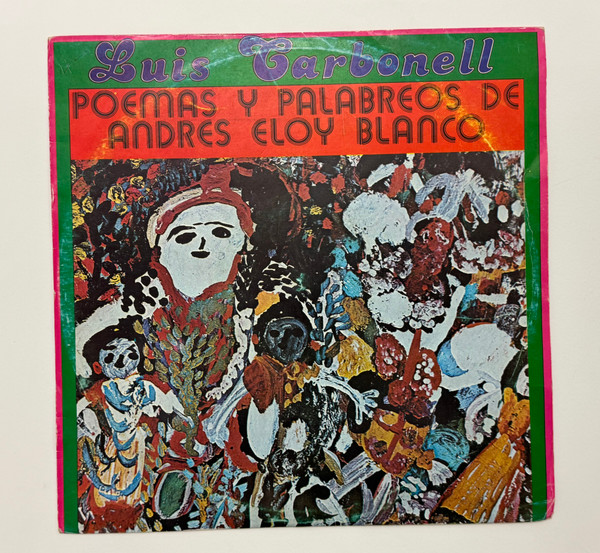

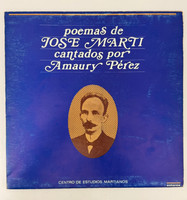
![EGREM/Areito (cover designer: unknown, orchestra: Orquesta Aragón), "Aragón," undated [likely 1970s]. Vinyl LP record](https://cdn10.bigcommerce.com/s-ufzvo/products/5965/images/6566/IMG_9643__69625.1762476049.200.200.jpg?c=2)
